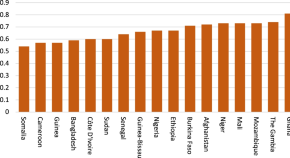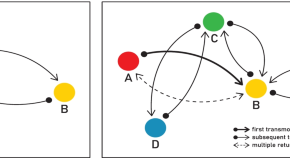Collection
The Shifting Geopolitics of Return Migration and Reintegration
- Submission status
- Closed
The recent geo-politicisation of return migration warrants deep consideration of the politics of return and reintegration. A focus on geopolitics prefigures the study of reintegration not just as circumstantial to the lives of migrants or the formal strategies of states but also as deeply embedded in the historical socio-cultural and political contexts where it takes place.
This special issue aims to address the multi-dimensional nature of reintegration and the contradictions between ideological positions, policies and practices in relation to it. It does so by establishing links between geopolitical shifts at different scales, their impact on return and the viability, dimensions and ‘outcomes’ of reintegration. For the purpose of this special issue, we define geopolitics as ‘the nexus – created in terminology and practice of geopolitics – between society, space and power; the nexus which is not essentially pre-existent, but that forms a fragment of the hegemonic discourses of modernity and has a powerful impact on social practice’ (Reuber, 2009: 451). Feminist takes on geopolitics are particularly pertinent to this special issue in the way that they ‘link international representation to the geographies of everyday life; [and help to] understand the ways in which the national and international are reproduced in the mundane practices we take for granted’ (Dowler & Sharp, 2001: 171).
The papers which follow are based on rich empirical research on the ground—both qualitative and quantitative—and address critical aspects of return migration which, otherwise, are to date unexplored. The diverse contributions cover geographical contexts across five continents and a much higher number of migration and return contexts around the world, with some papers based on ambitious comparative designs of two or more countries. Most importantly, the contributions shift the focus from the Global North and high-income countries in the West, to different gravity points across the globe where migration and return are intertwined with important bi-country and multi-country geopolitical implications.
Editors
-
Zana Vathi
Dr Zana Vathi has been conducting research in the field of migration since 2005. She is Reader/Associate Professor in Social Sciences at Edge Hill University in the UK. She was trained at the University of Sussex where she completed her PhD in Migration Studies in 2011. Dr Vathi is an expert in qualitative migration studies with fieldwork experience in in over 6 countries and with various migrant groups.
-
Russell King
Russell has held visiting appointments at the University of Malta (1977 and again in 2014), Ben Gurion University of the Negev (1981), the University of Trieste (1990) and Cornell (2005). During 2013 he was Willy Brandt Guest Professor in Migration Studies at Malmo University and he continues there as part-time visiting professor. In 1986 he was awarded the Royal Geographical Society's Edward Heath medal for his work on the geography of Europe and the Mediterranean, and he is Honorary Fellow of the Società Geografica Italiana. He was editor of the Journal of Ethnic and Migration Studies from 2000 till 2013.
-
Barak Kalir
Barak Kalir is an Associate Professor at the Department of Anthropology, University of Amsterdam. He is the co-director of the Institute for Migration and Ethnic Studies and is currently involved in the H2020 ADMIGOV project: Advancing Alternative Migration Governance.
Articles (11 in this collection)
-
-
Beyond ‘Just Comes’ and ‘Know-It-Alls’: Exploring Strategies to Deal with Returnee Stigmas During Diaspora Return Visits for Knowledge Transfer
Authors
- Charlotte Mueller
- Katie Kuschminder
- Content type: OriginalPaper
- Open Access
- Published: 16 August 2022
- Pages: 427 - 443
-
Performing a ‘Returnee’ in Benin City, Nigeria
Authors
- Mariia Shaidrova
- Content type: OriginalPaper
- Open Access
- Published: 23 July 2022
- Pages: 503 - 520
-
Editorial Introduction: The Shifting Geopolitics of Return Migration and Reintegration
Authors
- Zana Vathi
- Russell King
- Barak Kalir
- Content type: OriginalPaper
- Open Access
- Published: 27 June 2022
- Pages: 369 - 385
-
Return to Mexico: Exploring Reintegration Experiences
Authors
- Lorena Guzmán Elizalde
- Content type: OriginalPaper
- Published: 25 May 2022
- Pages: 465 - 483
-
Re-Balancing the Reintegration Process and the Potential of Mentoring for Returnees: Evidence from Senegal, Guinea and Morocco
Authors (first, second and last of 4)
- Nassim Majidi
- Ceri Oeppen
- Stefanie Barratt
- Content type: OriginalPaper
- Published: 17 May 2022
- Pages: 563 - 583

-
The Role of Identity and Ontological (In)Security in Return Migration: an Empirical Perspective from Hungary
Authors
- Gabor Lados
- Gabor Hegedus
- Zoltan Kovacs
- Content type: OriginalPaper
- Open Access
- Published: 13 May 2022
- Pages: 445 - 464
-
The Challenges of Educational Reintegration and the Psychosocial Wellbeing of Returnee Children: Evidence from Latvia
Authors
- Daina Grosa
- Russell King
- Content type: OriginalPaper
- Open Access
- Published: 04 May 2022
- Pages: 407 - 426
-
Migrant Entrepreneurs as Agents of Development? Geopolitical Context and Transmobility Strategies of Colombian Migrants Returning from Venezuela
Authors
- Yvonne Riaño
- Content type: OriginalPaper
- Open Access
- Published: 27 April 2022
- Pages: 539 - 562

-
The Geopolitics of the Family: Negotiating Return and its Impact on the Reintegration of Cameroonian Returnees
Authors
- Presca Wanki
- Ilse Derluyn
- Ine Lietaert
- Content type: OriginalPaper
- Published: 26 April 2022
- Pages: 521 - 538
-
On the Same Wavelength? Differing Geopolitical Positionalities and Voluntary Return and Reintegration in Ghana
Authors
- Ester Serra-Mingot
- Markus Rudolf
- Content type: OriginalPaper
- Open Access
- Published: 26 April 2022
- Pages: 485 - 502


